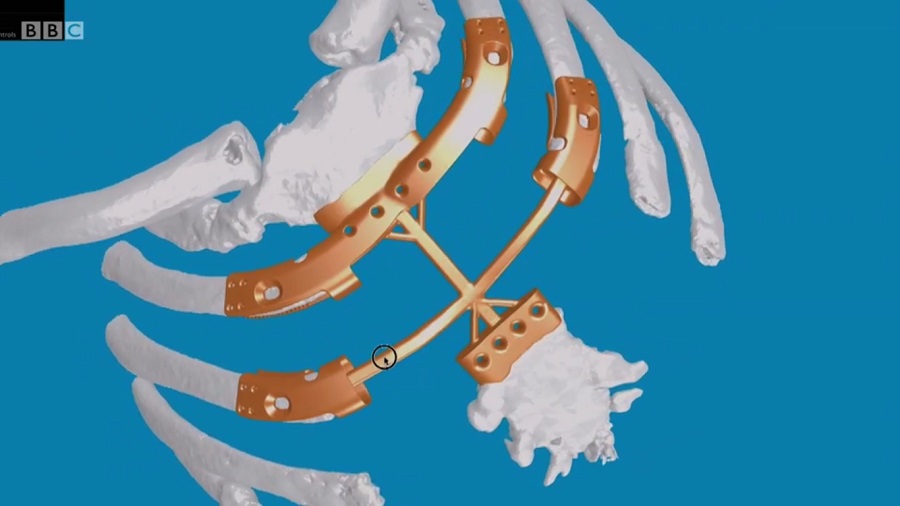Jesse, Sophie, and Adrian get together to chat about the uninvited microbes that stumble into our guts, storing films on DNA, the mutations behind mirror movement disorder, and CSIRO's 3D printing of a titanium sternum We also speak with Michelle Trautwein about her new project 'Arthropods of Our Homes'.
Episode 3 of Interronauts and we’re talking about the uninvited microbes that stumble into our guts, how you can store Amazon gift cards on DNA, the mutations behind mirror movement disorder, and our 3D printing of a titanium sternum and polymer tissue with Anatomics. We also speak with Michelle Trautwein about her new project ‘Arthropods of Our Homes’ to catalogue the Australian arthropods we share our homes with. Enjoy the show, why don’t you.
Science news
- Microbiome is influence by chance encounters — “Chance is an overlooked factor in the wide variation of microbe gut populations between individuals, new research suggests. These microbiome variations, which are also affected by diet and environment, contribute to gastrointestinal disorders such as colitis and Crohn’s disease,” from Science Daily. Full paper: Vega and Gore (2017) Stochastic assembly produces heterogeneous communities in the Caenorhabditis elegans intestine. PLOS Biology, 15 (3).
- Using DNA as a storage device — “In the famous double-helices of life’s fundamental molecule, Yaniv Erlich and Dina Zielinski from the New York Genome Center and Columbia University encoded the movie, along with a computer operating system, a photo, a scientific paper, a computer virus, and an Amazon gift card. They used a new strategy, based on the codes that allow movies to stream reliably across the Internet. In this way, they managed to pack the digital files into record-breakingly small amounts of DNA,” from The Atlantic. Full paper: Erlich and Zielinski (2017) DNA Fountain enables a robust and efficient storage architecture. Science, 355 (6328).
- Linked mutation and mirror movement disorder — “A condition forcing people to involuntarily mirror movements in opposing limbs has been linked to a common developmental brain disorder. Scientists from The University of Queensland collaborated with international researchers to discover mutations in a specific human gene – DCC – led to a condition known as agenesis of the corpus callosum (ACC),” from Scimex. Full paper: Marsh et al. (2017) Mutations in DCC cause isolated agenesis of the corpus callosum with incomplete penetrance. Nature Genetics.
Interview

“The proportional diversity of arthropod types across all of the rooms surveyed.” Image: Bertone, et al.
This week we spoke with Michelle Trautwein from the California Academy of Sciences, who runs the Arthropods of Our Homes project, which catalogues the proportions of arthropods we share our homes with. About the project: “For all of human history, insects and their relatives (collectively known as arthropods) have been our constant companions. We compete with them for food, use them as resources, and – whether we like it or not – share our homes with them. Many species, both common and unfamiliar, have been evolving with us for millennia. The Arthropods of Our Homes project explores the arthropod diversity of our homes. We are interested not only in what species are present, but also how the characteristics of your home and lifestyle may affect the insects, spiders and other arthropods that come to dwell there.”
CSIRO news

An computer generated image of the 3D printed device in the ribcage
BBC’s recent “Trust me I’m a doctor” celebrated the success of the world first surgery. Image: BBC
Bone, cartilage and tissue; we’ve cracked the trifecta (and it’s made of titanium and plastic)
“We’ve been quietly working away in Melbourne on something big. The big trifecta of a bone, cartilage and tissue implant. The first of its kind. More specifically, a 3D printed titanium and polymer sternum to suit individual patients. Feeling like you’ve already heard about this? That’s because in 2015 we partnered with Anatomics to 3D print a sternum and rib implant for a Spanish cancer patient,” from our blog. Learn more about the break-through here.
Listen and subscribe
- iTunes — Subscribe to us on iTunes and leave us a rating and review, if you’re so inclined.
- SoundCloud — Have a listen on SoundCloud if it’s easier.
- RSS feed — Plug the URL of our RSS feed into whichever RSS devourer you use.
Contact us
You can get in touch with the Interronauts team via Facebook, Twitter @CSIROnews, Instagram @csirogram, or by emailing us at socialmedia@csiro.au. Thanks for listening!


